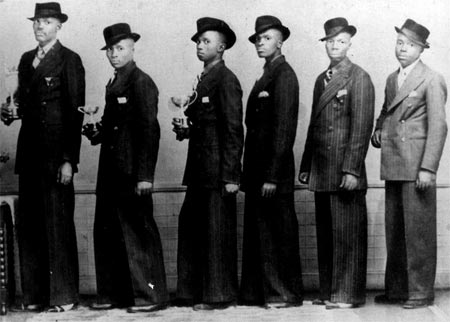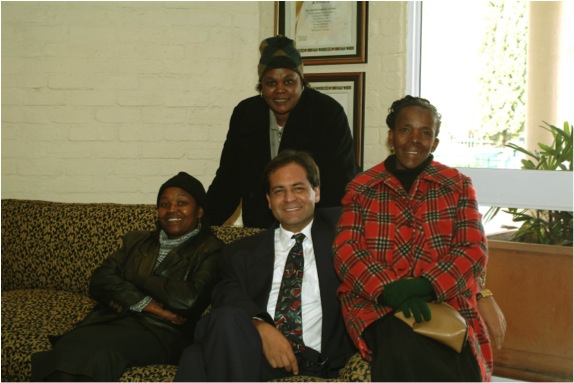Professor Owen Dean’s much anticipated book, “Awaking the Lion – The case of The Lion Sleeps Tonight” has been published by Tafelberg Publishers. It takes the form of a so-called “short” book and is only available electronically as an e-book from Amazon, Kobo, Kalahari and Leisure Books.
The book tells the story behind the story of a copyright saga that made international headlines, and gives Prof Dean’s first-person account of the pioneering and proudly South African case that made legal history. It deals with the saga of the song, Mbube, which later became the world-renowned song The Lion Sleeps Tonight.
After Solomon Linda, a struggling South African musician, composed the work he signed away his rights. In this book, Prof Dean, copyright expert and counsel for the Linda family, tells the gripping story of the battle for reparation for the impoverished Linda family against international entertainment giant Walt Disney and others more than 50 years after Linda’s death. This is a legal thriller with a happy ending and a truly South African flavour. It is a must read for students, academics and laymen alike.
The format of a Tafelberg short book requires the author to have his say within the confines of 10 000 to 12 000 words. As a colleague of Prof Dean and a fellow of his Chair of Intellectual Property Law, I had the benefit of having access to all the documentation and the full court record comprised in The Lion Sleeps Tonight case. This documentation is voluminous (to say the least) and encompasses about one thousand pages.
It is no mean feat to digest such a volume of information and material and to do proper justice to it in a work of 12 000 words and, moreover, at the same time deal with the inside story of what went on behind the scenes in preparing and conducting the litigation.
Prof Dean has acquitted himself of his task admirably and has presented a lucid and interesting account of this exceedingly complex subject matter in a manner which makes for easy reading and understanding. He has certainly succeeded in condensing and summarising large bodies of information in a few short sentences or paragraphs without detracting from the comprehensive nature and flow of the narrative or stripping the facts of its particular nuances. I mention a few notable examples.
- The factual history, which gave rise to the case, is sufficiently outlined in approximately 2 pages of the book. By contrast, the article published in Rolling Stone Magazine by Rian Malan (which was the spark which ignited the case) covered the same ground, and yet it comprised some 39 pages. To read the full text of Malan’s article, republished by ColdType Modern Classics, click here. Similarly, the BBC World Service radio program “Greatest Hits Of The World – Part 2” which covered the same story, took up 18 minutes of narration. To listen to the Podcast of this program click here.
- The author outlines the legal basis of the Linda Estate’s claim against Walt Disney in but two pages. The Particulars of Claim used in the court action instituted against Walt Disney and the other Defendants required 21 pages. Full text of the particulars of claim is available here.
- The author’s summation of the court’s judgement in the counter-application brought before the court by Walt Disney took up 3 paragraphs, while the court’s judgement [click here] comprised 5 pages.
- The author’s analysis of the retrospective operation of the Copyright Act, 1978 in relation to the ownership of the copyright in works made prior to 1979, and of Section 5(2) of the Imperial Copyright Act, which made provision for the all-important reversion or interest in copyright, took up a few paragraphs. His doctoral thesis entitled “The Application of the Copyright Act, 1978, to works made prior to 1979” which dealt with this issue consists of 445 pages. The full text is available here.
- The evolution of the song Mbube through Wimoweh into The Lion Sleeps Tonight, with each subsequent version being a reproduction of a substantial part of the preceding version giving rise to copyright infringement, is dealt with in one paragraph, almost in passing. However, making this factual judgement and outlining the considerations that led to the aforementioned conclusion would ordinarily require many pages of dense legal text. In fact, the original legal opinion written at the time (by Prof Dean for Gallo Music) outlining these facts comprised 37 pages and could comfortably give rise to a discussion covering many more pages. To read the opinion click here. Listening to the three versions of the song and comparing them best illustrate this point. To listen to:
- “Mbube” originally recorded by Gallo Records as performed by Solomon Linda and “The Evening Birds”, click here.
- “Wimoweh” by Pete Seeger and “The Weavers”, click here.
- “The Lion Sleeps Tonight” by Hugo Peretti, Luigi Creatore and performed by Anita Darian and “The Tokens” with English words by George David Weiss, click here.
- To this analysis can be added an appraisal of the version of The Lion Sleeps Tonight performed by the 1997 Broadway Cast for the musical “The Lion King” [click here], which was later used in the Walt Disney Film by the same name.
In short, it is to the author’s credit that he was able to deliver his message in around 30 pages, whereas a book of around 250 pages would have not been amiss and would have given him the freedom to give full expression to the story. The book is but the tip of the iceberg of the story of “The Lion Sleeps Tonight” case. Furthermore, the author should be commended for the level of care and effort invested in this book to make it accessible and particularly entertaining reading for everyone regardless of their interest in, or knowledge of, law or intellectual property.
Despite Prof Dean’s close contact with the impoverished and demoralised Linda family before and throughout the legal proceedings (which spanned several years), his portrayal of the family is succinct and objective. He paints a portrait of Solomon Linda’s musical career at the height of the Sofiatown era in Johannesburg that is similarly restrained yet accurate and fitting within the context of the narrative. Indeed, Solomon Linda’s socio-economic circumstances are graphically represented by a photograph of him, together with his group, “The Evening Birds”. His description of the press conference given after the successful conclusion of the case, and the impact that it made on the world at large, is similarly understated. Indeed, Prof Dean’s humility is present throughout the book to such an extent that it is only noticeable to those who are familiar with the events of the case. A more accurate picture is obtained by perusing the text of the press statement which was released at the time, together with some of the (many) newspaper articles which appeared at the time [click here]. The reaction of the Linda sisters to the outcome of the litigation is illustrated in the annexed photograph of them, together with Hanro Friedrich (the family attorney) taken at the time of the conclusion of the case. This evokes the author’s concluding sentence to the effect that the family and other victors in the case ought to live happily ever after.
The book has been described as a fascinating and heart-warming story. This it certainly is. However, while it cannot really be classified as legal literature, it is a worthwhile supplement to the author’s legal writings on the subject of The Lion Sleeps Tonight case, not in the least his discussion of it contained in his “Handbook of South African Copyright Law”. It brings a human dimension to his academic legal analysis of the case and is thus a worthwhile supplement to his substantial oeuvre of legal literature.
Cobus Jooste
COPYRIGHT NOTICE:
This review article contains photographs and links to sound recordings, public documents of record, other articles and newspaper clippings. Copyright in this material belongs to the individual authors/creators of the respective works or the assigned copyright owners. It is reproduced or referred to here in terms of sections 18 and 19, read with section 12(1)(b), of the Copyright Act 98 of 1978 for the exclusive purposes of criticism and review of a work.
EDITORS NOTE:
The eBook is sold for between ZA R25.00 and R35.00, available here:
- Amazon (Kindle Edition)
- Kobo
- Kalahari.com
- Leisure Books
- Tafelberg Publishers
- NB Publishers



